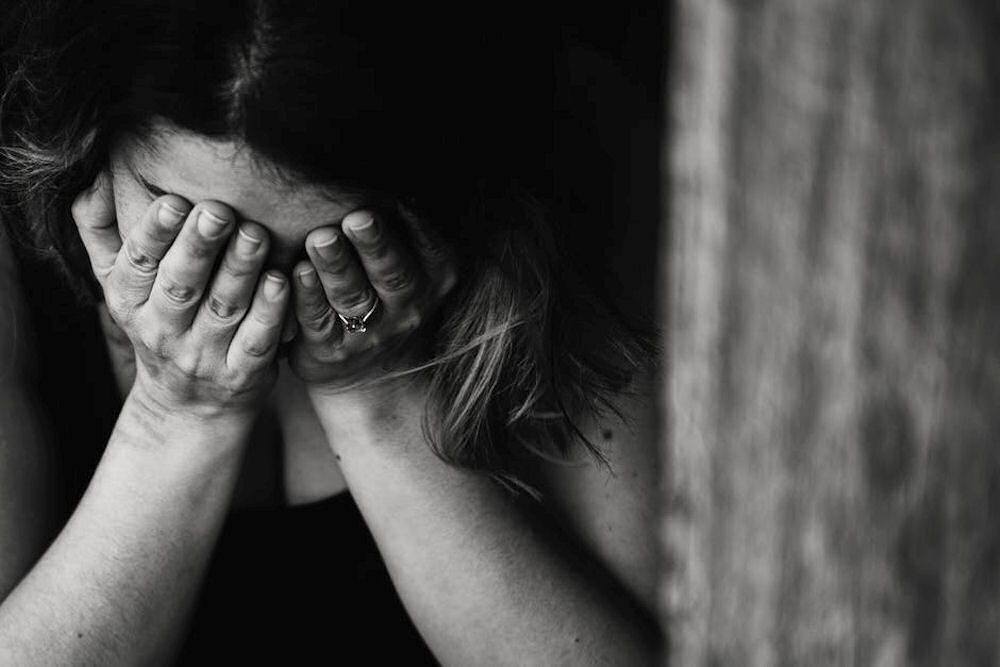Anxiety is a common mental health disorder that affects millions of people worldwide. It’s normal to experience anxiety in certain situations. But when anxiety interferes with daily life, it can have long-term effects on both physical and mental health. It can also affect a person’s likelihood of developing addiction, which can complicate a person’s efforts to become sober.
Short-Term Effects of Anxiety
Anxiety can cause a range of short-term physical symptoms, such as:
- Increased heart rate
- Rapid breathing
- Sweating
- Muscle tension
- Feelings of panic
These symptoms are part of the body’s natural response to stress, also known as the fight-or-flight response (which can also include the freeze reaction). While this response is crucial in dangerous situations, experiencing it frequently or for prolonged periods can take a toll on the body.
In addition to physical symptoms, anxiety can also impact mental well-being. In the short term, someone with anxiety may experience:
- Feelings of restlessness
- Irritability
- Difficulty concentrating
- Sleep disturbances
These short-term effects can affect daily functioning and quality of life. Suffering from the effects of anxiety from a traumatic experience can also erode a person’s ability to cope and heal, which leads to a vicious cycle that further disempowers the person.
Short-term symptoms of anxiety can vary from person to person. Some people may experience a decrease in appetite, leading to unintended weight loss, while others may find themselves turning to food for comfort. This can result in compulsive overeating and potential weight gain.
Moreover, the short-term effects of anxiety can extend to social interactions and relationships. People dealing with anxiety may withdraw from social situations, isolate themselves from friends and family, or have difficulty communicating effectively. This social withdrawal can lead to feelings of loneliness and make the prospect of asking for help seem overwhelming, creating a hard environment in which to cope.
Long-Term Effects of Anxiety
When anxiety becomes chronic, it can have more significant and long-lasting effects on the body. Prolonged exposure to stress hormones, such as cortisol, can disrupt various bodily systems and contribute to the development of health conditions.
Chronic anxiety can increase the risk of high blood pressure, heart disease, and stroke. The constant activation of the fight-or-flight response can put excessive strain on the cardiovascular system. Those at risk for cardiovascular problems may be advised by medical professionals to work to reduce their stress to prevent future problems.
Anxiety can also affect the immune system, making individuals more susceptible to infections and illnesses. This can have significant implications for overall physical health and a person’s ability to heal. Chronic inflammation, which is associated with many diseases, may be influenced by long-term anxiety.
Anxiety can contribute to gastrointestinal issues such as irritable bowel syndrome (IBS) and stomach ulcers. The gut-brain connection plays a crucial role in anxiety-related digestive problems. This may mean that treating one may actively help relieve symptoms of the other.
Another area where chronic anxiety can have a profound impact is on sleep patterns. Individuals experiencing long-term anxiety may struggle with insomnia, difficulty falling asleep, staying asleep, or experiencing restful sleep. This lack of quality sleep can further exacerbate anxiety symptoms, creating a vicious cycle.
Moreover, chronic anxiety can also manifest physically through muscle tension and chronic pain. The body’s response to stress can result in tight, sore muscles, particularly in the neck, shoulders, and back. Over time, this persistent muscle tension may lead to chronic pain conditions such as tension headaches or fibromyalgia (although it highly depends on the person’s medical history).
A person’s overall mental health can be significantly impacted by long-term anxiety. It can contribute to the development of depression, substance abuse disorders, and other mental illnesses. The constant worry and fear a person may feel can lead to social isolation, decreased productivity, and impaired overall well-being (all of which can exacerbate existing mental illnesses).
Types of Anxiety Disorders

Anxiety disorders are categorized into different types based on their specific symptoms and triggers, and are part of a broader group of mental disorders.
Panic disorder involves recurrent panic attacks, which are sudden episodes of intense fear and physical discomfort. They may be triggered by specific conditions, and require targeted therapy to overcome.
Social anxiety disorder is characterized by an intense fear of social situations and interactions. This may be treated with exposure therapy or individual therapy that deals with the inciting incident.
Generalized Anxiety Disorder (GAD) is a common type of anxiety disorder that affects millions of people worldwide. Individuals with GAD often experience persistent and uncontrollable worry about various aspects of their lives, such as work, health, or relationships. Treatment for GAD typically involves a combination of therapy, medication, and lifestyle changes to help individuals manage their symptoms and improve their quality of life.
Obsessive-Compulsive Disorder (OCD) is another type of anxiety disorder that is characterized by intrusive thoughts (obsessions) and repetitive behaviors (compulsions). People with OCD may feel compelled to perform certain rituals or routines to alleviate their anxiety or prevent perceived harm. These rituals can take up a significant amount of time and interfere with daily activities. Cognitive-behavioral therapy (CBT) is often used to treat OCD by helping individuals challenge and change their obsessive thoughts and compulsive behaviors.
Who is Most Likely to Have an Anxiety Disorder?
Anxiety disorders can affect anyone, regardless of age, gender, or background. However, certain factors may increase the risk of developing an anxiety disorder, including:
- Genetics: Anxiety disorders tend to run in families, and growing up around someone with anxiety may normalize symptoms of anxiety.
- Environmental factors: Experiencing trauma or chronic stress can also contribute to the development of anxiety disorders.
- Certain Personality Traits: A person who has tendencies to be overly cautious or having a tendency to worry, may be more prone to anxiety.
- Cultural and Societal Influences: Individuals living in high-stress environments may be at a higher risk for anxiety disorders.
- Culture of Perfectionism/Achievement: Being under pressure to meet unrealistic expectations and societal standards can create a breeding ground for anxiety and stress.
- Life Transitions or Major Life Events: Periods of uncertainty, change, and/or increased responsibilities can overwhelm the coping mechanisms of some individuals. Examples of this include starting a new job, moving to a new city, or going through the process of a divorce.
These factors may trigger or exacerbate anxiety disorders in susceptible individuals. But it’s important to note the difference between chronic and acute anxiety. If a person suffers from symptoms of anxiety for a prolonged period, it’s worthwhile to consult with a medical professional to see if long-term solutions should be considered.
How Anxiety Relates to Addiction

There is a strong connection between anxiety and addiction. Many individuals with anxiety turn to substances or behaviors as a way to self-medicate or cope with symptoms. Substances like alcohol, drugs, and prescription drugs may provide temporary relief from anxiety, but they can also lead to dependence and addiction.
This may not be a typical reaction, but individuals with a substance use disorder may develop a form of anxiety as a result of their addiction. The brain changes caused by substances can disrupt the natural balance of neurotransmitters, leading to anxiety and other mental health issues. A “bad trip” or negative experience while using an addictive substance can lead to a period of anxiety after the fact.
It is important to note that the relationship between anxiety and addiction is complex and multifaceted. For some individuals, anxiety may precede the development of addiction, but other people may find that addiction exacerbates pre-existing feelings of anxiety. Individuals with co-occurring anxiety and addiction may face unique challenges in seeking help and adhering to treatment. The stigma surrounding mental health and substance use disorders can lead to underdiagnosis and undertreatment of both conditions. People who suffer from both conditions need comprehensive treatment approaches that address anxiety and addiction concurrently, referred to as dual diagnosis treatment.
What is a Dual Diagnosis?
A dual diagnosis refers to the co-occurrence of a substance use disorder and a mental health disorder. When an individual has both conditions, it can complicate treatment and recovery. Dual-diagnosis treatment programs address both the addiction and the mental health issue simultaneously, tailoring treatments to address both in a healthy way that doesn’t aggravate the other.
Individuals with a dual diagnosis may experience a range of challenges, including difficulties in managing symptoms of both disorders, increased risk of relapse, and a higher likelihood of overdose. People dealing with anxiety may already be more reluctant to seek help for mental health concerns, so the shame of having an addiction may compound the problem. Dual-diagnosis treatment programs often incorporate individual therapy, support groups, medication management, and holistic therapies to address the complex needs of people suffering from dual diagnosis.
Principles Recovery Helps Treat Anxiety and Addiction

Offering evidence-based therapies such as cognitive-behavioral therapy (CBT), Principles Recovery can teach individuals healthier coping mechanisms and help them challenge negative thinking patterns. Our team of skilled professionals is here to help you work through obstacles and build a life of sobriety.
Reach out to us today if you’re ready to start your journey toward sobriety. Anxiety doesn’t have to halt your journey to sobriety. We at Principles Recovery know the struggle, and we’re here to help.
